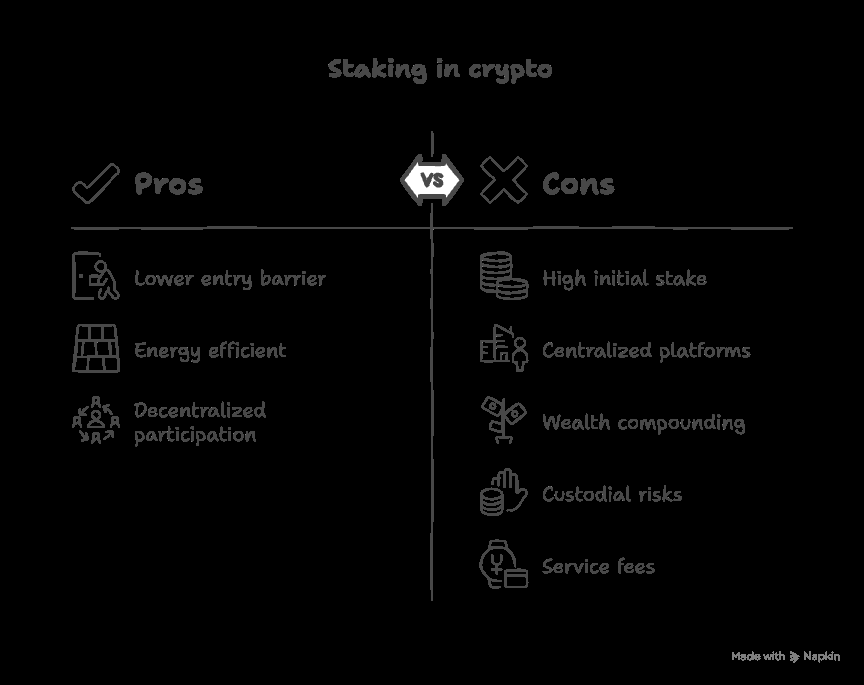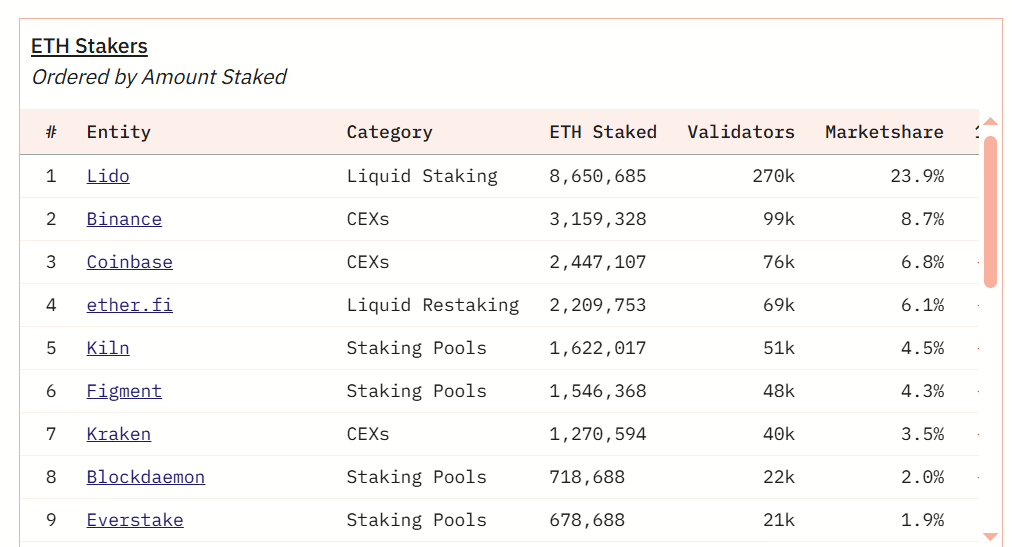As proof-of-stake (PoS) becomes the dominant consensus mechanism in blockchain, its technical and environmental advantages are often praised—lower energy consumption, improved scalability, and faster transaction speeds. Ethereum’s landmark transition from proof-of-work (PoW) to PoS during “The Merge” in 2022 marked a turning point, signalling that staking wasn’t just an alternative—it was the future.
On the surface, staking appears to offer a sustainable, mutually beneficial system: users lock up their tokens, help secure the network, and earn passive rewards in return. But is crypto staking a good idea in the long run, especially if it subtly reinforces the same inequities blockchain promised to fix?
Behind this appealing model lies a set of uncomfortable ethical questions that the crypto community is often too eager to overlook.
Who really gets to participate in staking—and who gets left out? Is staking reinforcing financial inequality by favouring those who already hold substantial wealth? And as validator power becomes increasingly concentrated, are we simply swapping one form of centralization for another?
These questions strike at the heart of what blockchain was supposed to disrupt: exclusion, inequality, and centralized control. If we fail to confront the ethical implications of staking, we risk undermining the very principles that crypto was built upon.
What Is Staking and How Does It Work?
Staking is the process through which certain blockchain networks, those using Proof of Stake (PoS) or similar consensus mechanisms, maintain security and validate transactions without the high energy costs associated with mining. In PoS-based systems like Ethereum (after the Merge), Cardano, Solana, and others, staking replaces the need for energy-intensive computation with a more efficient mechanism: Participants “lock up” their cryptocurrency to support the network.
To understand how this works, consider Ethereum as an example. To become a validator on Ethereum, a user must stake 32 ETH (worth over $110,000 as of mid-2025). These staked funds act as a form of collateral, signalling commitment to the network’s integrity. Once staked, the participant’s coins are locked, and the validator is randomly selected to confirm transactions and create new blocks. In return for this service, they earn staking rewards, comprising newly issued ETH and a portion of transaction fees.
This model has led many people to wonder: Can you make money staking crypto consistently? Yes—but the full picture is more complex. Rewards vary based on network activity, validator performance, and staking method (solo vs pooled).
It’s important to note that not all cryptocurrencies support staking. Bitcoin, for instance, uses Proof of Work (PoW) and therefore cannot be staked. However, many other major cryptocurrencies, such as Tezos, Polkadot, and Algorand, do offer staking opportunities, each with unique rules, minimum requirements, and reward structures.
READ ALSO: Proof of Work (PoW) Vs Proof of Stake (PoS): How Are They Different?
While staking offers a more environmentally friendly alternative to mining, it comes with its own set of considerations. These are often ethical or economic, such as centralization risks, wealth-based validator selection, and the need for trust in staking providers, rather than purely technical challenges.
Barriers to Entry for Everyday Users
At first glance, staking appears more democratic than mining—there’s no need for expensive hardware or energy-guzzling setups. But beneath this seemingly inclusive model lies one of the most overlooked ethical challenges in crypto: accessibility. Who truly gets to participate in staking, and who is systematically excluded?
Staking is often hailed as a more equitable alternative to proof-of-work mining; however, the reality is more complex. To become a validator on Ethereum, for example, users must stake 32 ETH. That requirement alone places independent staking far beyond the reach of most global participants.
For Muslims and others with faith-based financial concerns, this also raises the question: Is crypto staking haram? The answer isn’t straightforward. While staking rewards resemble interest or profit-sharing, interpretations vary. Some scholars argue that PoS systems align more with ethical investing than usury, while others call for caution due to speculative elements. As with other financial products, individual intent and implementation matter.
READ ALSO: Islamic Finance and the Blockchain Era: A Search for Ethical Compatibility
To lower the barrier, many turn to staking pools or third-party staking services, which allow users to participate with smaller amounts. However, these alternatives often come with trade-offs: users may face service fees, custodial risks, or a loss of control over their funds. According to a survey by Blockworks, about 60.6% of participants use third-party staking platforms, gravitating toward large, integrated services that simplify the process and reduce the technical burden. Yet this reliance on intermediaries reveals a deeper issue.
Those with limited capital often have to depend on centralized platforms, while wealthier participants can afford to stake independently, maintain full autonomy, and collect higher returns. This creates a two-tiered system within networks that were designed to be decentralized and equitable. The more crypto you can afford to stake, the more rewards you earn—and over time, this compounds wealth for the already wealthy.
It raises a critical ethical question: Is crypto staking a good idea if it ultimately rewards the rich for being rich? If the system is structured so that access and profit are determined primarily by existing wealth, then we’re not just decentralizing finance; we’re potentially reinforcing financial inequality under a new banner.
RELATED: Will Crypto’s Wealth Distribution Ever Be Fair?

The Illusion of Decentralization: How Staking Pools and Financial Elitism Threaten Blockchain Ideals
Staking was once championed as a fairer, greener alternative to Proof of Work—one that would open up crypto participation to more people while reinforcing decentralization. But in practice, it’s slowly morphing into a system that mirrors traditional financial elitism, with power consolidating not through banks or mining farms, but through staking pools and institutional dominance.
To bypass the high capital requirements of solo staking—like Ethereum’s 32 ETH minimum—many users turn to staking pools. These platforms aggregate user funds to meet the threshold and distribute rewards proportionally. While this model lowers the barrier to entry, it comes at a steep ethical cost: centralization.
Data from Dune Analytics shows that over 40% of all staked ETH is controlled by just three entities: Lido Finance, Coinbase, and Binance—with Lido alone holding nearly 26%.

This kind of concentration undermines the core principle of decentralization and raises several risks. Centralized staking providers can be pressured by governments to censor transactions or enforce surveillance-driven compliance. They also represent single points of failure—if one provider is hacked or taken offline, the security and functionality of the entire network could be compromised. More concerning still, these entities gain outsized influence in protocol governance, enabling them to steer network decisions in their favour and dilute the democratic nature of blockchain ecosystems.
At the same time, staking is evolving into a two-tier system. At the top are whales and institutional players who can stake independently, maintain full control, and maximize rewards. At the bottom are everyday users—especially those in developing regions—who must rely on third-party platforms that take a cut of their earnings and limit their autonomy.
Rather than empowering the average person, staking increasingly rewards those who already have the most, reinforcing wealth inequality within a supposedly decentralized framework. And with growing technical complexity, questions like, Can I lose my crypto by staking become a valid concern. Yes—especially in pooled or custodial setups, where risks like slashing, platform failure, or custodial mismanagement are real. While rare, these events can result in permanent loss of assets.
In trying to solve the technical and environmental problems of crypto, we risk recreating the very financial hierarchies it was meant to dismantle. If decentralization becomes merely symbolic, dominated by staking cartels and financial elites, then blockchain won’t be a revolution. It will just be the same old system, wearing a different mask.
Conclusion: We Need an Ethical Framework for Staking
Proof of Stake has brought undeniable benefits to the crypto ecosystem, dramatically reducing energy consumption and enhancing scalability. Yet, beneath these technical gains lie ethical concerns that can’t be brushed aside: the concentration of wealth and power among a few, the creeping centralization of validators, and the growing inaccessibility of participation for everyday users.
To move forward responsibly, the industry must rethink how staking is designed and governed. Protocols should be built to encourage decentralization, not just efficiency. Mechanisms like weighted randomness or caps on validator influence could help prevent the dominance of large players and ensure fairer participation.
At the same time, user education must be prioritized. People deserve to understand the real trade-offs between staking solo, using a pool, or turning to custodial platforms, so they can make informed choices without sacrificing control or fairness.
Regulators also have a role to play, but their approach must be balanced. Cracking down on smaller players while allowing large centralized platforms to expand unchecked would only accelerate the very centralization we hope to avoid.
Staking has the potential to be a more ethical, sustainable alternative to Proof of Work—but only if we design it with intention. Without careful scrutiny and reform, we risk replicating the same systems of inequality and centralized control that blockchain was meant to disrupt. Now is the time to build a framework that aligns not just with technological innovation, but with the values of fairness, transparency, and true decentralization.
Disclaimer: This piece is intended solely for informational purposes and should not be considered trading or investment advice. Nothing herein should be construed as financial, legal, or tax advice. Trading or investing in cryptocurrencies carries a considerable risk of financial loss. Always conduct due diligence.
If you want to read more market analyses like this, visit DeFi Planet and follow us on Twitter, LinkedIn, Facebook, Instagram, and CoinMarketCap Community.




















